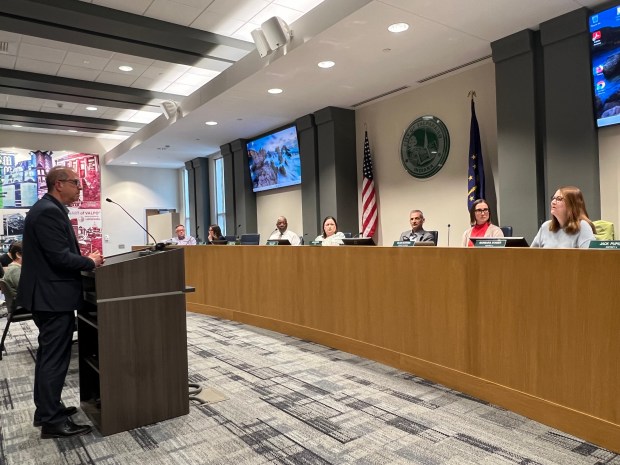Mayor Brandon Johnson scored two major victories Friday as the Chicago City Council passed his $1.25 billion bond plan and a $70 million migrant package.
The two big outlays faced tough pushback and an array of holdups as they worked through City Hall. But their ultimate passage gives Johnson much-needed money to continue the daily churn of migrant caretaking while adding a sprawling pool of cash to spend on housing, job growth and cultural projects.
The migrant spending plan required a full-court press from Johnson’s team. Staffers methodically briefed aldermen on the plan, and Cook County Board President Toni Preckwinkle even made calls to wrangle votes.
The effort helped the funding pass in a 30 to 18 vote. Still, the fissures of a council bitterly divided shone bright as the legislation crossed the finish line.
The ordinance continued to face fierce opposition Friday from opponents who contended the money should instead go to long-term Chicago residents. Aldermen representing Black neighborhoods on the South and West sides led the dissent, calling the caretaking effort bloated and not transparent while maintaining their struggling wards deserve the money more.
“As much as our heart goes out, we’re not seeing it in our community,” Ald. David Moore, 17th, said.
The funding adds to the $150 million the city has already budgeted for this year’s migrant care. The addition is part of a joint plan alongside the county and state to fund the endeavor through the end of 2024. The county and state pledged $250 million in February. At the time, Johnson initially bristled when asked if he had agreed to the final $70 million needed to fully meet projected costs.
Supporters painted the vote to pay for migrant care not as a choice, but a necessity. Without funding, thousands of migrants will still come to Chicago, but will instead go homeless and stretch city resources, they said.
Texas Gov. Greg Abbott has sent thousands of migrants to Chicago via bus and plane, Ald. Andre Vasquez, 40th, said. Politically-motivated migrant shipments will ramp up before the Democratic National Convention whether the city has money to pay for care or not, he said.
“Do you want to see 11,000 people inside of shelters or outside of buildings? People do not disappear because the money does not show up,” Vasquez said.
”]
Divisions lingered too around the $1.25 billion bond plan that passed in a 32 to 17 vote. For the fourth, fifth and sixth time, opponents of the plan made motions to dramatically change it.
Ald. Bill Conway, 34th, proposed lowering the plan’s total amount to $750 million, a halfway-measure between the $350 million he proposed last week and Johnson’s own proposal. Moments later, Ald. Brendan Reilly, 42nd, repeated an effort to lower the threshold at which bond-backed projects would require the City Council’s approval from $5 million to $1 million. Ald. Raymond Lopez, 15th, later proposed a $2.5 million threshold. All three motions failed.
Ald. Sam Nugent, 39th, panned the lack of oversight over many expensive projects and uncertainty around what the money will go toward before her “no” vote.
“We are being asked to sign a $1.25 billion check, and we just don’t know what we are paying,” she said. “The threshold is too high for oversight, and there’s not enough transparency.”
The bevy of attempted amendments reminded Vice Mayor Ald. Walter Burnett, 27th, of the infamous “Council Wars” of the mid-1980s, when a bloc of white aldermen attempted to stymie every effort made by Mayor Harold Washington, he said.
High interest rates make housing and business projects harder to complete for developers, said Burnett, whose ward includes the booming Fulton Market district. The funding will help Chicago attract and finish projects to grow the city and its tax base, he said.
“It takes about three years to do a ribbon cutting. Do you all want to keep playing with this stuff?” he said. “There’s an opportunity to do things in this city, in your wards with this bond deal.”
“We need to spread this tax base across the city. We cannot keep taking money just from the central areas. And the only way we can spread this tax base is if we spark development across the city,” Burnett added.
As part of the plan, the city expects to pay off $2.4 billion in accumulated debt through 2061 by using property tax revenues that would become available thanks to expiring tax increment financing, or TIF, districts.
”]
jsheridan@chicagotribune.com





